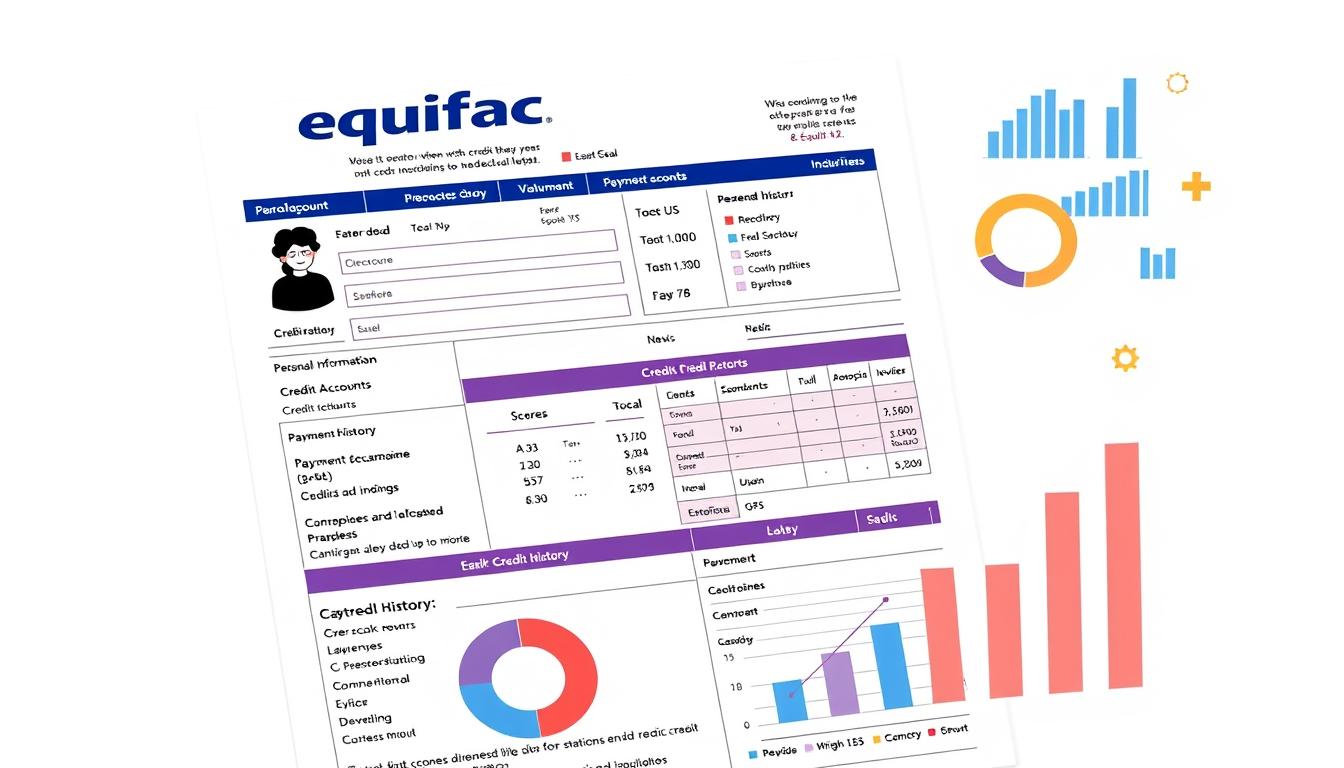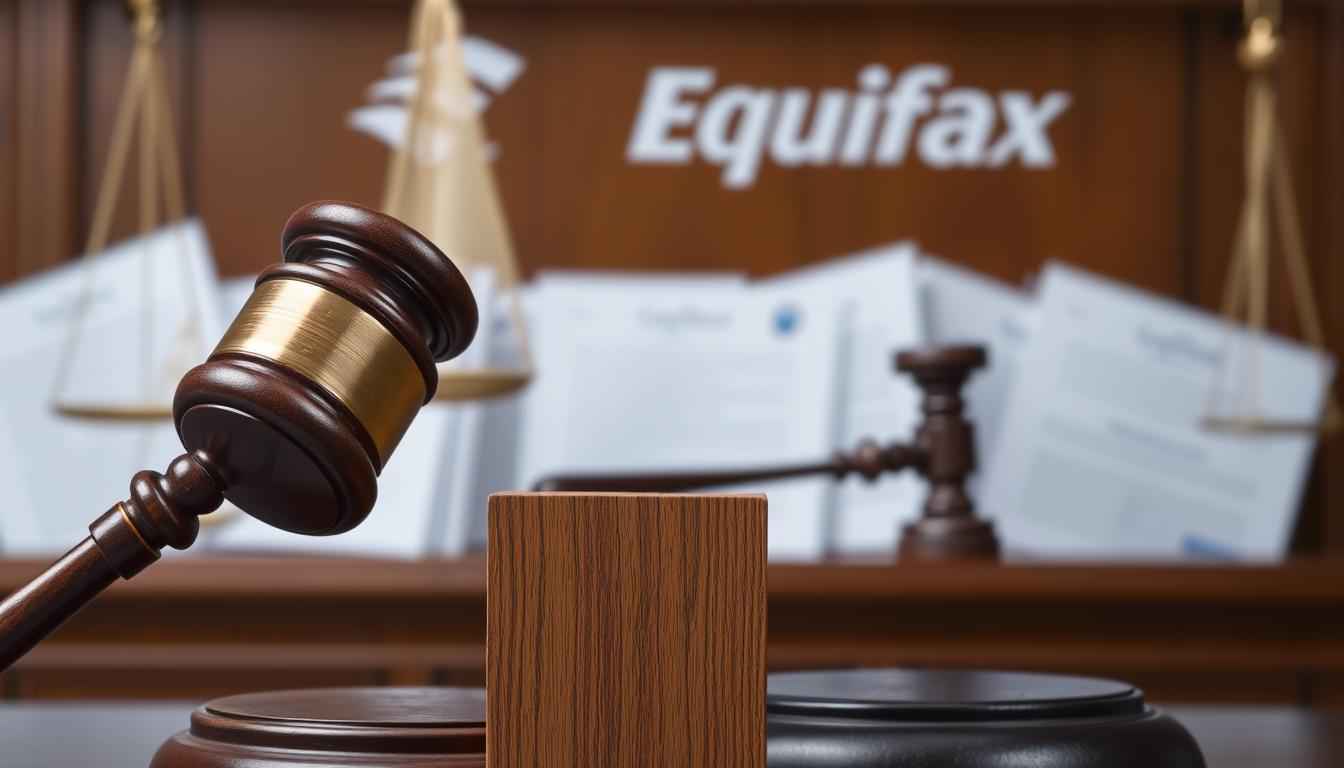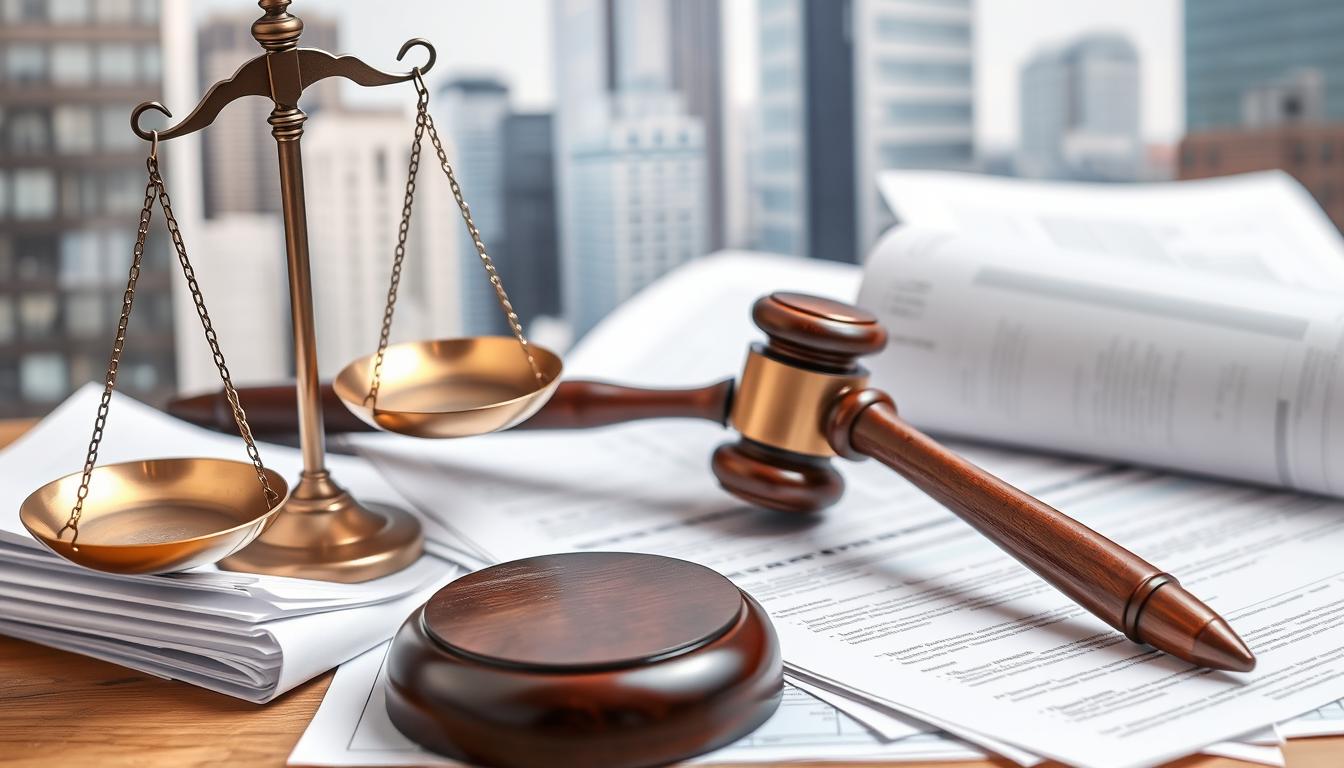Errors on your Equifax credit report can hurt your financial life. These mistakes may impact your credit score and loan options. You have the right to sue Equifax for these inaccuracies.
Equifax is a major credit bureau that handles consumer credit information. Their errors can affect your ability to get loans and credit cards. This guide will help you address these issues.
We’ll show you how to spot credit report errors and dispute them. You’ll learn when to file a lawsuit and seek compensation. This guide covers identity theft, account mix-ups, and other reporting problems.
Key Takeaways
- Understand the different types of credit report errors that can occur and their impact on your finances
- Learn how to properly dispute inaccuracies with Equifax and navigate the credit report correction process
- Discover the legal grounds and steps to sue Equifax for providing a flawed credit report
- Explore the potential damages and compensation you may be entitled to if you win your case
- Uncover strategies to prevent future credit report errors and protect your identity
Understanding Credit Report Errors
Your credit report can greatly affect your financial health. Credit report errors happen more often than you’d expect. These mistakes can harm your credit score and limit your financial options.
Errors range from wrong personal details to fake account activities. They can seriously impact your creditworthiness and financial opportunities.
Types of Errors on Credit Reports
Credit report errors can take many forms, including:
- Inaccurate personal information, such as incorrect name, address, or date of birth
- Incorrect account details, including wrongly reported account balances, payment histories, or credit limits
- Fraudulent accounts or activities, such as those associated with identity theft
- Duplicate accounts or information, leading to inflated debt levels
Impact of Credit Report Mistakes
Credit report errors can have far-reaching effects. They may lower your credit score, making it harder to get loans or credit cards.
These mistakes can also affect your ability to secure housing or employment. Identity theft can cause major credit score damage and financial troubles.
Knowing about credit report errors is crucial for your financial future. Spotting and fixing these issues quickly can protect you from inaccurate information’s consequences.
Identifying Errors on Your Equifax Credit Report
Reviewing your Equifax credit report is vital for keeping your financial information accurate. By examining it closely, you can spot errors that may affect your creditworthiness. Here’s what to look for in your Equifax credit report:
- Incorrect personal information, such as your name, address, or date of birth.
- Accounts that don’t belong to you or have incorrect balance amounts.
- Credit report mistakes like late payments, collections, or bankruptcies that are not yours.
- Duplicate accounts or inquiries that should not be on your report.
Spotting these credit report errors is crucial for disputing and fixing them. A thorough review ensures your financial history is accurate and protects your credit score.
| Common Credit Report Errors | Potential Impact |
|---|---|
| Incorrect personal information | Can lead to identity theft and other financial issues |
| Inaccurate account information | May negatively impact your credit score |
| Duplicate accounts or inquiries | Can artificially inflate your credit utilization ratio |
Take charge of your credit history by disputing credit report mistakes with Equifax. This action helps ensure your report accurately shows your financial situation.

Steps to Take Before Suing Equifax
Before suing Equifax for credit report errors, take these important steps. Get a free credit report and review it carefully. Look for any inaccuracies or discrepancies in your report.
Requesting a Free Credit Report
The Fair Credit Reporting Act (FCRA) entitles you to a free annual credit report. You can get reports from Equifax and two other major credit bureaus. Visit AnnualCreditReport.com or call 1-877-322-8228 to request your free report.
Disputing Errors with Equifax
If you find errors on your Equifax report, dispute them directly with the bureau. Submit a written dispute with supporting documents to Equifax. The Fair Credit Reporting Act requires Equifax to investigate and respond within 30 days.
These steps create a clear record of your efforts to address the dispute. This documentation can strengthen your case if you decide to take legal action later.
Sue Equifax for Wrong Credit Report
Spotting errors on your Equifax credit report? You might have a case against them. Equifax must provide accurate credit information by law. Mistakes can lead to loan denials and higher interest rates.
The Fair Credit Reporting Act (FCRA) safeguards your credit report rights. You can sue Equifax for negligent or willful violations. This includes ignoring disputes, slow error corrections, or sharing false info.
To sue Equifax successfully, gather proof of report mistakes and financial harm. Collect loan rejections, credit denials, and high-interest rate evidence. Show you tried to resolve issues with Equifax first.
Winning your case could mean Equifax pays for actual losses and emotional distress. They might face punitive damages for severe violations. The potential payout makes exploring legal options worthwhile.

“Equifax’s failure to maintain accurate credit reports can have devastating financial consequences for consumers. Holding them accountable through the courts is often the best way to seek justice and prevent future errors.”
Preparing Your Case Against Equifax
Found errors on your Equifax credit report? Legal action might be necessary. Proper preparation is key to building a strong case against Equifax. Gather the right documents and learn about the Fair Credit Reporting Act (FCRA).
Gathering Supporting Documentation
Collect all documents that support your claim. This includes:
- Copies of your Equifax credit report, clearly highlighting the errors you’ve identified
- Correspondence with Equifax regarding the disputed items, such as letters, emails, or call records
- Proof of financial harm or other damages you’ve incurred due to the inaccurate information on your credit report
- Documentation of any attempts you’ve made to correct the errors directly with Equifax
Understanding the Fair Credit Reporting Act
The Fair Credit Reporting Act (FCRA) governs consumer credit information handling. It protects your rights and allows you to dispute incorrect credit report data. Knowing the FCRA is crucial for your case against Equifax.
Important FCRA provisions for your lawsuit include:
- Equifax’s obligation to investigate and correct any disputed information on your credit report
- Your right to receive a free copy of your credit report annually
- Potential damages you may be entitled to if Equifax fails to comply with the FCRA
Solid preparation and FCRA knowledge will help you hold Equifax accountable. You can fight against credit report errors that have hurt your finances.
Filing a Lawsuit Against Equifax
Persistent credit report mistakes can be frustrating. When Equifax fails to fix them, legal action might be necessary. Let’s explore the process of suing Equifax and key considerations.
Choosing the Right Court
Deciding on the appropriate court jurisdiction is crucial. You may file in federal or state court, depending on the credit report errors.
Consider these factors when choosing:
- For significant financial harm, federal court may be best under the Fair Credit Reporting Act (FCRA).
- State court suits local issues or smaller damages.
- Check your state’s statutes of limitations, as they affect lawsuit timing.
A consumer rights attorney can help determine the best court. They’ll ensure you file within the required timeframe.
| Factors to Consider | Federal Court | State Court |
|---|---|---|
| Financial Harm | Significant, such as denied credit or employment | Localized or smaller-scale issues |
| Legal Basis | Fair Credit Reporting Act (FCRA) | State-specific consumer protection laws |
| Statutes of Limitations | Varies by state | Varies by state |

Choosing the right court boosts your chances of winning. It helps you get justice for credit report mistakes affecting your life.
Potential Damages and Compensation
Suing Equifax for an inaccurate credit report may lead to various forms of compensation. These can include monetary and non-monetary remedies. The goal is to restore your financial well-being and credit standing.
You may recover monetary compensation for direct financial losses due to credit report errors. This could cover costs of repairing credit score damage and identity theft protection expenses. Punitive damages may apply if Equifax’s actions were willful or egregious.
| Potential Monetary Damages | Potential Non-Monetary Damages |
|---|---|
|
|
Courts may also order non-monetary relief. This can include restoring your accurate credit report and improving your credit score. Injunctive relief may prevent future credit report errors.
These non-monetary remedies can help rebuild your financial standing. They also protect you from future identity theft or credit score damage.
“The potential for both monetary and non-monetary damages is a powerful incentive for Equifax to take your credit report errors seriously and work to resolve them promptly.”
Your specific damages will depend on your case details and local laws. Work with an experienced attorney to understand your rights. They can help you maximize your potential recovery.
Credit Repair Services and Alternatives
Credit repair services offer help with disputing errors on credit reports. They claim to improve credit scores. However, their effectiveness and legality are often questioned.
Pros and Cons of Credit Repair Services
Let’s look at the potential benefits and drawbacks of these services:
| Pros | Cons |
|---|---|
|
|
Choosing a credit repair service requires careful thought. Weigh the benefits against the drawbacks. Consider other options too.
You can dispute mistakes directly with Equifax. Another option is seeking help from a credit counseling agency.

Understanding these services helps you make a smart choice. You can address credit report mistakes effectively. This way, you’ll work towards your desired credit profile.
Preventing Future Credit Report Errors
A clean, accurate credit report is vital for your financial health. Credit report errors can harm your credit score. Here are steps to prevent errors and protect your identity.
Regular Credit Report Monitoring
Check your credit reports from Equifax, Experian, and TransUnion regularly. You get one free report annually from each bureau. Review these reports for any discrepancies or inaccuracies.
Credit Monitoring and Identity Theft Protection Services
Consider using credit monitoring and identity theft protection services. These alert you to suspicious activity on your credit reports. They can help you catch credit report errors and potential identity theft issues quickly.
Understanding Your Consumer Rights
Learn about the Fair Credit Reporting Act. It outlines your rights regarding credit reports. You can dispute inaccurate information and get free annual credit reports.
Knowing your rights helps you tackle Equifax credit errors and other reporting issues. This knowledge empowers you to protect your credit effectively.
| Preventing Credit Report Errors | Benefits |
|---|---|
| Regular Credit Report Monitoring | Catch errors early, maintain accurate credit profile |
| Credit Monitoring and Identity Theft Protection | Receive alerts to suspicious activity, protect against identity theft |
| Understanding Consumer Rights | Empower yourself to dispute inaccuracies and protect your credit |
These steps can help reduce the risk of credit report errors. Stay vigilant and address issues promptly. This approach maintains a healthy credit profile and protects your financial well-being.
Identity Theft Protection and Credit Monitoring
Protecting your personal and financial info is crucial in our digital world. Identity theft protection and credit monitoring services help detect credit report errors. They also shield your sensitive data from unauthorized access.
These services offer a range of features to keep you safe. They monitor your credit monitoring reports for suspicious activity. They alert you to potential fraud and help resolve issues.
By watching your credit reports, you can spot identity theft protection concerns quickly. This helps keep your finances secure.
| Feature | Importance |
|---|---|
| Credit Report Monitoring | Regularly check your credit reports for any unauthorized activity or errors, allowing you to address them promptly. |
| Identity Theft Insurance | Provides coverage for the costs associated with restoring your identity and credit, should you become a victim of identity theft. |
| Cybersecurity Assistance | Offers guidance and support in protecting your online accounts and personal information from cyber threats. |
Using identity theft protection and credit monitoring services can boost your financial safety. These tools help maintain accurate credit reports. They also reduce the impact of credit report errors.
“Identity theft can ruin your good name and credit, and it can take years to restore your reputation.”
Conclusion
We’ve explored credit report errors and legal options, including suing Equifax for inaccurate information. Understanding these mistakes and their impact helps you address discrepancies quickly. Knowing your rights under the Fair Credit Reporting Act is crucial.
We’ve outlined the process of disputing errors with Equifax and filing a lawsuit if needed. This knowledge empowers you to hold credit agencies accountable for financial harm caused by credit report mistakes.
Regularly reviewing your credit report is key to protecting your financial health. Stay vigilant for any sue equifax for wrong credit report issues. This guide helps you navigate the complex world of equifax lawsuit and consumer rights.
Use this information to ensure your credit history accurately reflects your financial profile. Take action to maintain a fair and correct credit report.

